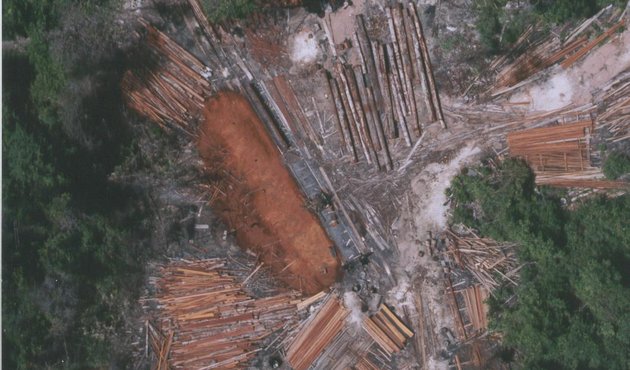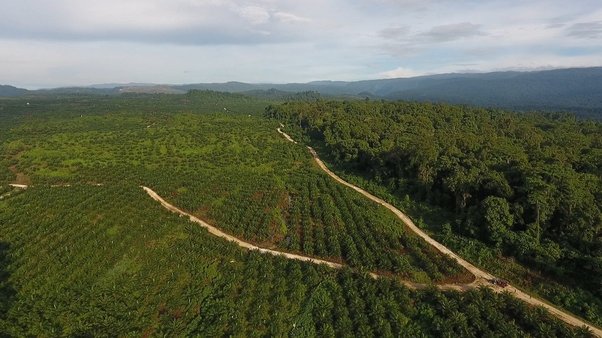MPs from both sides of the House have shown their support for new due diligence obligations by backing an amendment to prevent the City of London from bankrolling businesses carrying out deforestation worldwide.
By supporting an amendment tabled by Chris Grayling MP to the Financial Services and Markets Bill – a "once in a generation" chance to change UK financial regulation – the Labour frontbench and MPs from other parties have called time on over a decade of empty promises that UK banks will stop investing in deforestation.
The House of Lords must now take this agenda forward by voting in favour of new due diligence obligations and ensure human rights protections are included too when the time comes in January.
This is more urgent than ever. Tropical forests are shrinking before our eyes and experts say commodity driven deforestation must be ended by 2025 at the latest for the world to limit global warming to 1.5°C.
Yet Global Witness last year reported British banks and asset managers poured $16.6 billion into just 20 businesses implicated in deforestation between 2016- 2020. And our latest data shows that voluntary net zero pledges made by financial institutions are failing to significantly reduce the funds flowing to forest-risk businesses.
Just days before the Westminster debate, the EU passed a historic new law to prevent the import of deforestation-linked products. That law will trigger a review into how European financial institutions drive deforestation.
This cannot come soon enough for the world’s forests and the indigenous peoples who are under constant threat for guarding them.
Global Witness has long called for laws to stop the flow of toxic finance from the world’s top financial centres to projects that are destroying the world’s climate critical forests.
Last year, the UK introduced due diligence obligations for companies trading in ‘forest risk commodities’ such as palm oil, soy and beef under the Environment Act.
An amendment to the Financial Services and Markets Bill is the perfect law to extend those same obligations to UK financial services too.
Speaking to his amendment Grayling, who co-chairs the All-Party Parliamentary Group on Global Deforestation said:
“We need to extend the work we have already done on forest-risk products, and those who directly deal in them, to the financial services sector and the banks that fund companies that have the potential to participate directly or indirectly, knowingly or unknowingly, in illegal deforestation.”
UK financiers ploughed $16.6 billion into businesses linked to #deforestation from 2015-20.
— Global Witness (@Global_Witness) December 9, 2022
This week Chris Grayling MP asked MPs to shut off the money pipeline from the City of London to forest destruction.
Here's why the Financial Services & Markets Bill needs amending 👇 1/3 pic.twitter.com/DHJCsASDyy
Responding to the debate, the UK’s Economic Secretary Andrew Griffith said:
“[Chris Grayling] talked, on this day of the biodiversity summit in Montreal, about the deforestation crisis and the need for financial providers to do due diligence on where their money is going. That is of course absolutely right. It is what we expect from good stewardship.”
Acknowledging something is important is very different from taking the necessary steps to make it happen, however.
Griffith appeared to suggest that the Taskforce on Nature-related Financial Disclosures (TNFD) could solve the UK’s deforestation financing problem, despite overwhelming evidence to the contrary.
The Global Resource Initiative – an independent taskforce created by the UK government and chaired by Sir Ian Cheshire, the former chair of Barclays – has already recommended new due diligence legislation to stop the UK bankrolling deforestation precisely because TNFD alone will not stop deforestation finance in practice.
What is needed is not warm words or more corporate disclosure, but laws to protect forests from irresponsible financiers. Now is the time for action.
The Financial Services and Markets Bill has been pitched as future-proofing the UK financial system, but MPs and NGOs including Greenpeace, WWF, Global Witness and the Finance Innovation Lab say it falls well short of that ambition.
Whilst the UK government stopped short of backing the legislative amendment on deforestation, it is under increasing pressure to do so.
The amendment saw support not only from the Conservative backbenches, but also from the Labour frontbenches well as MP spokespeople from the Liberal Democrats, Greens, DUP and Plaid Cymru.
The Bill will now be considered by the Lords, who Global Witness hopes will back these crucial new due diligence obligations.
Financiers should take note of these growing calls for change. At COP27 in Egypt, the UN Secretary General urged governments to bring forward regulation instead of relying on voluntary climate schemes.
And as global leaders meet in Montreal this month to try to bring an end to the biodiversity crisis, politicians across the political spectrum are increasingly noticing that there is a dangerous gap between the rhetoric and reality which is allowing the destruction of the lungs of our planet.
With most of the world's biodiversity residing in forests, their rapid destruction puts astonishing species, our planet and human rights everywhere in peril.
Look out for Global Witness as we continue to build pressure in the UK, EU, US and China to stop climate-wrecking profiteering from forest destruction.



